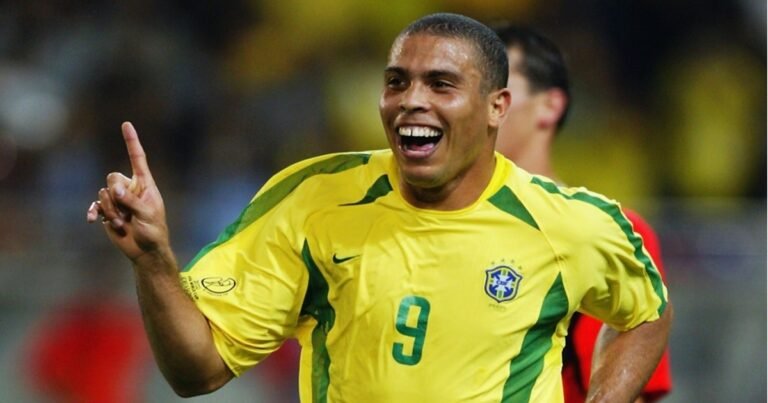Ronaldo Luís Nazário de Lima, often referred to simply as Ronaldo Nazário or “El Fenómeno,” is a name that resonates with every soccer fan across the globe. Known for his explosive speed, remarkable finishing, and almost superhuman agility, Ronaldo is considered one of the greatest players in the history of soccer.
This blog dives deep into Ronaldo Nazário’s legacy, tracking his rise to fame, his historic achievements, and the challenges he overcame. Plus, we include a special section of FAQs and key statistics that showcase why he will always be “The Phenomenon.”
Get ready to relive the glorious career of a soccer legend.
Table of Contents
The Early Life of Ronaldo Nazário
Ronaldo was born on September 18, 1976, in Bento Ribeiro, a suburb in Rio de Janeiro, Brazil. Despite growing up in a low-income neighborhood, his talent was evident early on. By the time Ronaldo turned 16, he had signed with Cruzeiro, one of Brazil’s top clubs, where he made an immediate impact, scoring 44 goals in just 47 appearances.
Early Breakthrough
Ronaldo’s skill caught the attention of European clubs, and in 1994, he joined PSV Eindhoven in the Netherlands. Despite being only 17, Ronaldo was prolific in the Eredivisie, outclassing defenders with his pace and precision. His ability to dribble at full speed and beat entire defenses became his trademark.
Rise to Stardom
Barcelona and Inter Milan Years
After leaving PSV Eindhoven, Ronaldo joined Barcelona for the 1996–1997 season. It didn’t take long for him to announce himself on the global stage. Scoring 47 goals in 49 matches, Ronaldo displayed not only extraordinary athleticism but also an instinct for finding the back of the net.
The following year, Ronaldo moved to Inter Milan, where Serie A defenders were stunned by his combination of strength and skill. He won the Ballon d’Or in 1997, becoming the youngest player in history to receive the prestigious award.
| Season | Club | Matches Played | Goals Scored |
|---|---|---|---|
| 1994–1996 | PSV Eindhoven | 57 | 54 |
| 1996–1997 | Barcelona | 49 | 47 |
| 1997–2002 | Inter Milan | 99 | 59 |
Injuries and Comebacks
While Ronaldo’s time at Inter brought plenty of glory, it was also marred by injuries. Between 1999 and 2001, he suffered two serious knee injuries that could have ended his career. However, demonstrating unparalleled resilience, Ronaldo made a stunning comeback.
Ronaldo’s Crowning Glory
2002 FIFA World Cup
Ronaldo Nazário is perhaps best remembered for his incredible performance in the 2002 FIFA World Cup. Having just returned from a career-threatening injury, Ronaldo silenced doubters by leading Brazil to their fifth World Cup title. Scoring 8 goals, including 2 in the final against Germany, he won the Golden Boot and etched his name in World Cup history.
Real Madrid and the Galácticos Era
Soon after the World Cup, Ronaldo joined Real Madrid, becoming a core member of the Galácticos era. He delighted fans with his signature stepovers, clinical finishing, and big-game performances. At Real Madrid, Ronaldo continued to be a global superstar, winning numerous trophies and gaining legions of fans.
Legacy of Ronaldo Nazário
- Ballon d’Or (1997, 2002): Ronaldo remains one of the few players to win two Ballon d’Or awards.
- FIFA World Player of the Year (1996, 1997, 2002): These accolades underline his dominance during his peak years.
- World Cup Icon: With 15 World Cup goals, Ronaldo is the second-highest goal scorer in tournament history.
- Resilience: Ronaldo’s ability to overcome injuries cemented his status as one of soccer’s most determined athletes.
Ronaldo’s blend of talent, work ethic, and adaptability set a benchmark for future generations of attackers. From his impactful stepovers to his breathtaking goals, Ronaldo redefined what it means to be a striker.
Personal Life and Post-Retirement
Post-retirement, Ronaldo has stayed involved in soccer as an owner of Real Valladolid and Cruzeiro. Off the pitch, he is a passionate advocate for charity work, often lending his voice to causes that uplift underprivileged communities.
FAQs About Ronaldo Nazário
Q1. What made Ronaldo Nazário so special?
Ronaldo Nazário’s combination of speed, dribbling, finishing, and physical strength was unparalleled. At his peak, he was unplayable, capable of creating and converting chances in seemingly impossible situations.
Q2. How many goals did Ronaldo score in his career?
Ronaldo scored 414 goals in 616 professional matches, an extraordinary return for one of soccer’s all-time greats.
Q3. Did Ronaldo Nazário play in the Olympics?
Yes, he represented Brazil in the 1996 Olympics, helping the team secure a bronze medal with some sensational performances.
Q4. How many Ballon d’Or awards did Ronaldo win?
Ronaldo won the Ballon d’Or twice, in 1997 and 2002.
Q5. How is Ronaldo Nazário different from Cristiano Ronaldo?
While both players are among soccer’s greats, Ronaldo Nazário was known for his flair, speed, and dribbling, while Cristiano Ronaldo is renowned for his athleticism, goal-scoring consistency, and adaptability over a prolonged career.
Why Ronaldo Nazário Will Always Be “El Fenómeno”
The career of Ronaldo Nazário is a story of extraordinary talent, resilience, and sheer genius. Despite setbacks and injuries, he achieved a level of greatness that transcends the sport. From his stunning performances for clubs like Barcelona, Inter, and Real Madrid, to his heroic role in winning Brazil the 2002 World Cup, Ronaldo remains a beacon of inspiration for players and fans alike.
For soccer historians, jersey collectors, or anyone who appreciates greatness in its truest form, Ronaldo Nazário embodies what being a legend is all about.
Want to relive more sports magic?
Subscribe for more content like this, and stay tuned as we continue exploring the stories of soccer’s greatest stars!

